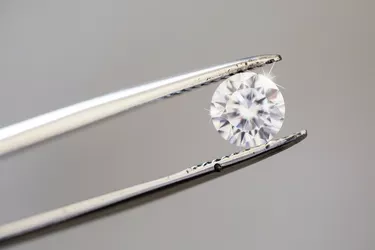
Diamonds may be cherished for their sparkle, but for the investment-minded, the future value of a given diamond is even more coveted. Whether a diamond will increase or decrease in value depends on a combination of overall market forces and internal proclivities of the diamond market. As of June 2015, prices for 1 carat to 1.49 carat round diamonds ranged from $1,792 to $20,760, depending on their clarity and color ratings.
Diamond Price Volatility
Video of the Day
Diamond industry analyst and consultant Edahn Golan notes that compared to other markets, diamonds do not swing as violently. Between 2004 and 2013, prices on the IDEX Online Polished Price Index, a composite index of different diamond prices, increased about 33 percent. Despite an occasional steep peak or trough, the range of prices was relatively moderate.
Video of the Day
Forces Behind the Flux
One reason for the moderation in price has been the impact the De Beers monopoly has on the market. If prices went down, De Beers tightened supplies of rough diamonds or increased prices, or vice versa if prices went up. However, worldwide economic forces also intervene to influence price outcomes.
The global economic climate acts as an instigator or damper on consumer enthusiasm for diamonds. During times of relative prosperity, diamond marketing campaigns and higher discretionary income team up to increase the demand for diamonds and fuel diamond prices. By the same token, retailers gauge the appetite for diamonds and plan inventories accordingly. If demand is high, they are more likely to invest in large inventories and pay higher prices.
Appreciation vs. Depreciation
Diamond Type
Whether a diamond appreciates or depreciates depends on the quality of the diamond. As personal finance website Bankrate notes, only one diamond out of 50 sold in 2010 was likely to appreciate. Diamonds that meet the classification of investment-grade diamonds, exhibiting the higher-end of the diamond-grading criteria of cut, clarity, color and carat rarely depreciate, notes eBay, and see greater appreciation in value over time than do standard diamonds.
Synthetic diamonds, which are created in a laboratory, are not going to appreciate and will depreciate.
Diamond Size and Shape
Golan notes that certain sizes and shapes in diamonds see greater volatility than others. Large 3-carat round diamonds see wild swings compared to smaller diamonds. Four-carats are the most active and during the period 2004 to 2008, tripled in price before the economic collapse. Following the recession, those diamonds recovered their value.
Diamond Investing Tips
When appraising a diamond with a view to sell, eBay suggests separating the diamond from the setting or other jewelry to which it is attached and appraising them individually. One component may appreciate while another depreciates, so separating them helps you derive a more accurate value.
The Global Diamond Portal offers several tips for investing in diamonds:
- Investment diamonds should be graded and verified by the Gemological Institute of America.
- Investments should be confined to round standardized diamonds that have an active market.
- High-value diamonds can be hard to resell due to a small niche.
- Factor in diamond transaction and delivery costs, which can be 2 to 5 percent of the investment cost.